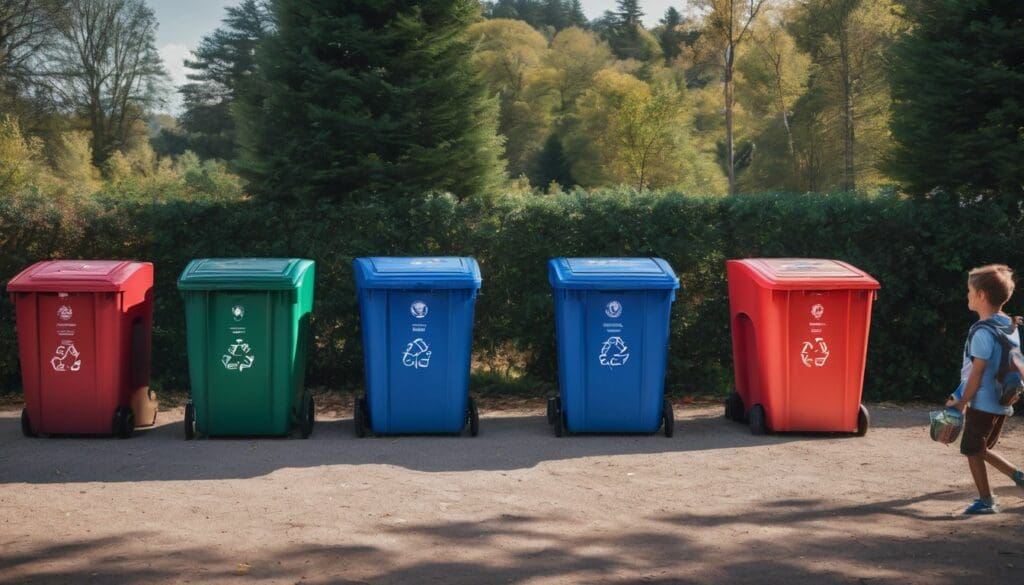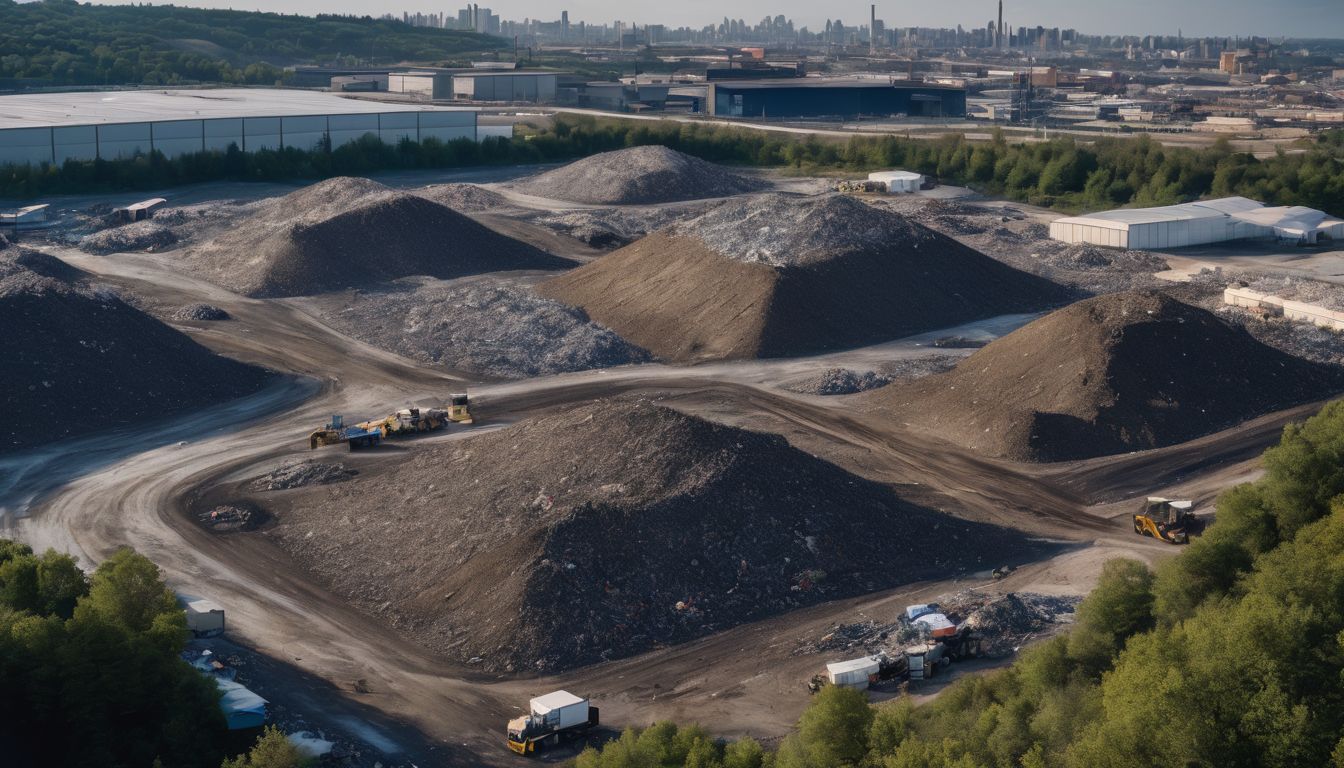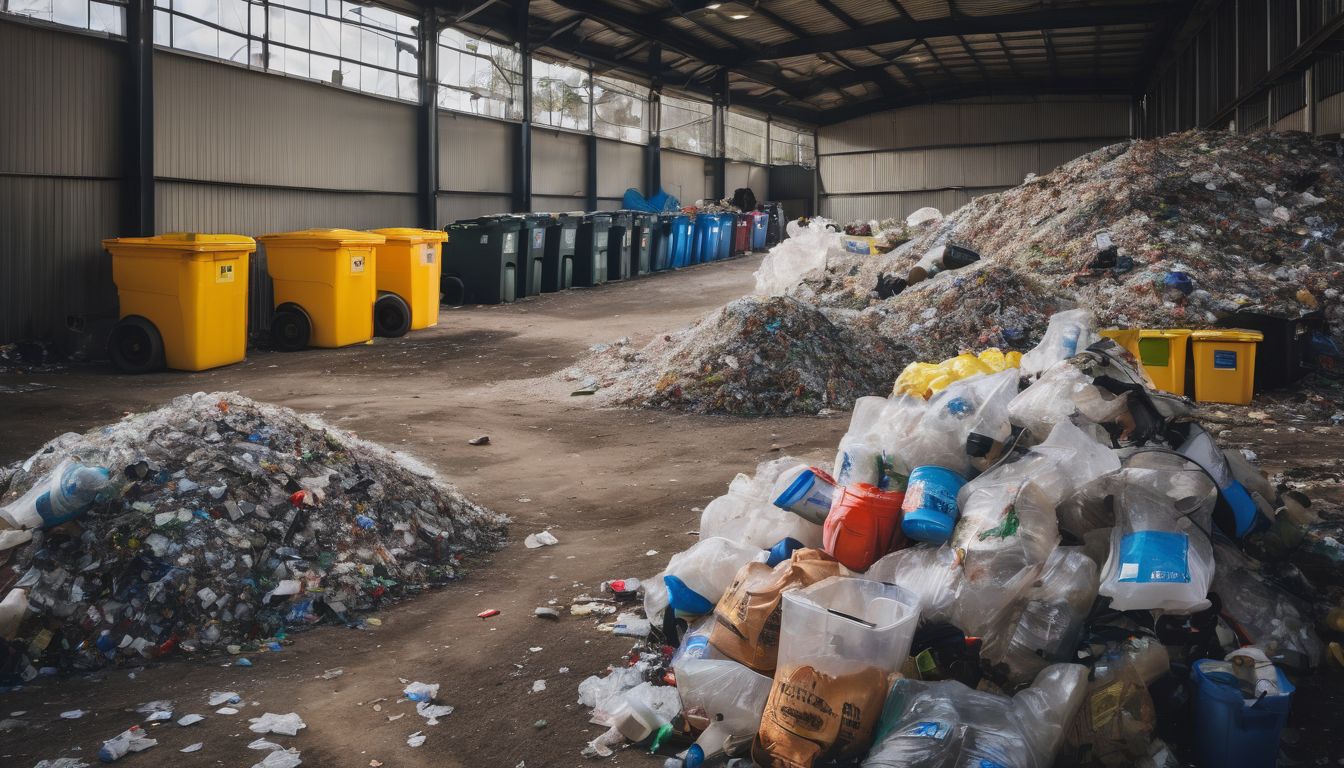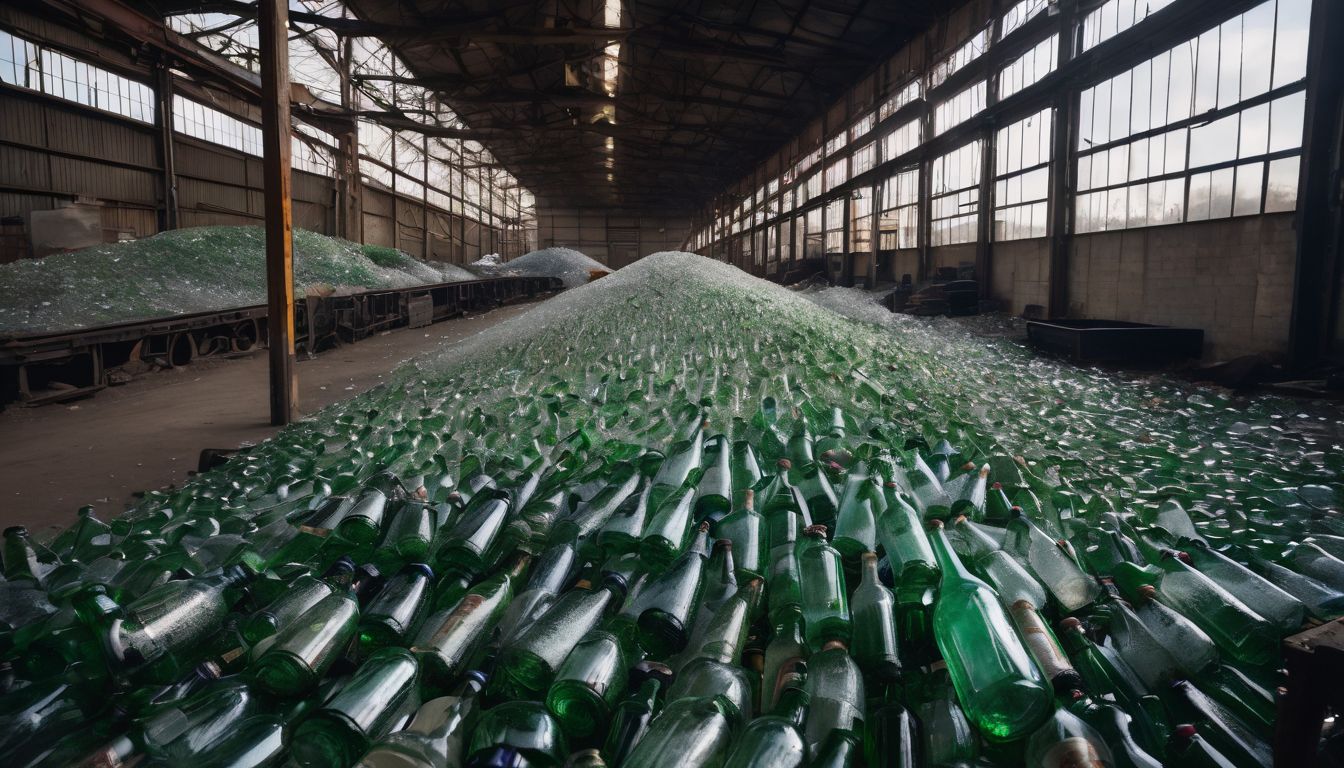Struggling to get your kids interested in recycling? It’s a common challenge, but with the right approach, you can turn it around. This blog post will provide practical tips and fun activities that will make recycling second nature for the younger generation.
Let’s create a greener future together!
Key Takeaways
- Show children the importance of recycling through your own actions, as leading by example demonstrates how individual efforts can impact environmental health.
- Turn recycling into a fun and engaging activity by incorporating games, crafts, and educational storytelling that highlight sustainability concepts.
- Clearly explain the benefits of recycling to children; discuss how it conserves resources, lessens pollution, and supports a sustainable economy.
- Set up accessible recycling systems at home and school to make it easy for children to participate in eco-friendly practices routinely.
- Involve kids in hands-on projects like gardening with compost or community clean-ups to foster a deeper understanding of their role in environmental conservation.
The Importance of Teaching Children about Recycling
Moving from understanding the basics of recycling, we delve into why it’s crucial to teach children about this eco-friendly habit. Early education on recycling shapes a sustainable mindset in young individuals and anchors them to environmental responsibility as they grow.
Children who learn to recycle become aware of their impact on the planet and are more likely to continue these practices into adulthood.
Instilling green values early on transforms kids into eco-conscious citizens capable of driving change for future generations. They not only apply these habits in their daily lives but also influence others around them, creating a ripple effect that enhances community efforts towards waste reduction and promotes sustainability consistently throughout society.
Engaging students in recycling initiatives at a tender age equips them with the knowledge and skills needed to tackle environmental challenges head-on, fostering a culture where conserving resources becomes second nature.
Tips for Encouraging Recycling Habits in Children
Set a good example by recycling and discussing its importance with your children. Make recycling fun by creating games or challenges related to sorting and disposing of waste. Explain the benefits of recycling, such as protecting the environment and conserving resources, in an age-appropriate manner.
Get creative by involving them in upcycling projects or crafts using recyclable materials. Make it easy for them to recycle by providing accessible bins and clear instructions on what can be recycled.
Set a good example
Demonstrate the value of recycling by being a positive role model for your children. Implement eco-friendly practices in your daily routine, such as separating recyclables from regular waste and using reusable items instead of disposable ones.
By actively participating in sustainable habits, you can show children the impact of individual actions on the environment. Encourage them to follow suit by explaining how small changes can contribute to a healthier planet for future generations.
Lead by example when it comes to conserving resources and minimising waste. Showcase the importance of reducing, reusing, and recycling through practical behaviour that inspires young minds to adopt eco-conscious initiatives in their own lives.
Make it fun
Engage children in recycling by making it a fun and interactive experience. Organise creative activities such as arts and crafts using recyclable materials to spark their interest.
Incorporate games where they can learn about the importance of recycling while having fun, reinforcing ecoconscious initiatives at an early age. Encourage them to take part in gardening projects using compost from organic waste, fostering a sense of responsibility towards the environment.
Introduce storytelling sessions or movies that highlight the impact of recycling on the planet, capturing their imagination and instilling environmental stewardship values. By transforming recycling into an enjoyable and educational activity, children are more likely to develop sustainable habits that will last a lifetime.
Explain the benefits of recycling
Recycling benefits the environment by conserving natural resources and reducing pollution. It significantly decreases energy consumption, lessens greenhouse gas emissions, and minimises landfill waste.
Recycling also creates job opportunities in the recycling industry and promotes a sustainable economy. By recycling materials like paper, plastic, glass, and metal, we can conserve raw materials and protect wildlife habitats.
Additionally, recycling helps to control global warming by reducing the need for extracting new raw materials while promoting a circular economy that minimises waste.
Get creative
After explaining the benefits of recycling, it’s time to get creative in encouraging children to embrace eco-friendly habits. Introduce recycled art projects or upcycling activities at home and in school to make recycling enjoyable for kids.
Engage them in making DIY crafts from recyclable materials, organising a recycled fashion show, or creating artwork from repurposed items. Incorporating creativity into recycling will inspire young minds and foster a sense of environmental responsibility.
Make sustainability engaging by involving children in gardening projects using compost from organic waste or launching eco-themed storytelling sessions. By integrating imaginative and interactive initiatives, you can instil a sustainable mindset and cultivate lasting eco-conscious behaviour among the younger generation.
Make it easy
Encouraging recycling in children can be made easy by placing clearly labeled bins for different types of waste around the house. When disposing of items, kids are more likely to recycle if they know exactly where each material goes.
Providing easily accessible recycling options makes it a seamless part of their daily routine, reinforcing the habit consistently. Additionally, investing in reusable products and simplifying the sorting process further reinforces the notion that recycling is convenient and straightforward for young minds.
To make it easy for students to recycle at school, strategically placing recycling bins next to trash cans can help embed the habit into their daily routine. By providing visual cues and making it effortless for students to contribute to environmental efforts, you’re creating an environment where sustainable behavior becomes second nature.
Involve them in projects
Get children actively involved in recycling projects to instil a sense of responsibility and ownership. Engaging them in hands-on activities will help them understand the impact of their actions on the environment. Here are some ways to involve children in recycling projects:
- Start a school or community garden that uses compost from organic waste for fertilisation, teaching kids about the full cycle of waste management and sustainability.
- Organise a clean – up campaign in local parks or beaches, showing children the immediate impact of reducing litter and the importance of responsible waste disposal.
- Establish a recycled art project, encouraging kids to use materials such as paper, plastic, and cardboard to create crafts, fostering creativity while reinforcing the concept of reuse.
- Initiate a “wasteless lunch” challenge where children pack lunches using reusable containers and minimise packaging waste, promoting conscious consumption habits.
- Collaborate on a recycling sorting activity, guiding children through identifying recyclable materials and understanding how proper sorting can contribute to reducing landfill waste.
Incorporating Recycling into School Curriculum
Conduct a classroom waste audit, implement a recycling reward system, and teach incoming students about the recycling program. To find out more creative ways to encourage recycling habits in children, keep reading!
Conduct a classroom waste audit
Initiate a classroom waste audit by distributing bins for different types of waste. Encourage students to sort and weigh the various types of waste produced.
- Engage students in collecting data on the amount of paper, plastic, and organic waste generated.
- Analyse the data to identify areas for improvement in waste reduction efforts.
- Involve students in brainstorming and implementing strategies to minimise the generation of different types of waste.
- Discuss the findings with the students and collectively develop action plans for waste reduction and recycling initiatives within the school.
- Celebrate successes and progress made in reducing waste through incentives or recognition for individual and group efforts.
Implement a recycling reward system
After conducting a classroom waste audit, the next step is to implement a recycling reward system. This proactive approach encourages students to participate in sustainable practices by offering incentives for their efforts.
By rewarding students who consistently recycle or take part in eco-friendly activities, schools can instil a sense of environmental stewardship and cultivate recycling habits from an early age.
Through this initiative, children learn the value of reducing waste and contributing to a cleaner, greener environment. The implementation of a recycling reward system acts as a positive reinforcement, motivating young individuals to actively engage in eco-conscious initiatives while promoting sustainability in schools.
Teach incoming students about the recycling program
Introduce incoming students to the recycling program by organising an interactive orientation session. Engage them in a fun and informative discussion about the importance of recycling, demonstrating how they can actively participate in reducing waste and preserving the environment.
Encourage their involvement through hands-on activities that promote recycling as a shared responsibility within the school community.
Involve new students in the recycling program from day one, setting the stage for ongoing participation in sustainable practices throughout their academic journey. This approach fosters a sense of environmental stewardship and ensures that eco-friendly habits become second nature to future generations.
Ways to Encourage Recycling in High School and College/University
– Student-led sustainability initiatives can help to promote recycling and waste reduction on campus. Learning from successful school programs can also provide valuable insights into effective ways to encourage recycling habits in high school and college/university students.
Student-led sustainability initiatives
High school and college/university students can take the lead in promoting sustainability through various initiatives. They can organise awareness campaigns, such as “Recyclemania,” to engage their peers in recycling efforts.
By customising recycling bin graphics with catchy slogans and visuals, they can make recycling more appealing and accessible on campus. Moreover, joining recycling competitions not only fosters healthy competition but also encourages students to actively participate in waste reduction efforts.
Learning from successful school programmes across the globe shows that student-led sustainability initiatives are effective in creating a culture of environmental responsibility within educational institutions.
Learning from successful school programs
School programmes that successfully promote recycling and sustainability can serve as valuable models for other institutions. By observing initiatives such as student-led sustainability projects, customised recycling bin graphics, and participation in recycling competitions, environmentally conscious individuals can gain insights into effective strategies.
Additionally, engaging with these successful school programmes provides the opportunity to learn from their experiences and adapt similar approaches to encourage eco-conscious behaviours among children.
Embracing the principles of these impactful initiatives is crucial for fostering environmental awareness and promoting sustainable habits in educational settings.
Customizing recycling bin graphics
To encourage recycling among children, customising recycling bin graphics can have a significant impact. By creating visually appealing and informative designs on the bins, children are more likely to engage with the recycling process.
Bright colours and clear symbols can help kids understand which items belong in each bin – promoting the correct disposal of waste materials. This visual cue also reinforces the importance of recycling in an engaging way, fostering a sense of environmental responsibility from a young age.
Implementing customised recycling bin graphics ensures that the concept of recycling becomes prominent at schools and homes by making it accessible and understandable for children.
It creates a lasting impression on their young minds regarding eco-friendly practices.
Joining recycling competitions
High school and college students can demonstrate their commitment to environmental sustainability by participating in recycling competitions. These events provide a platform for young people to showcase their innovative ideas and initiatives for waste reduction.
By taking part in such competitions, students can apply their knowledge of recycling practices while also gaining valuable experience in implementing eco-friendly solutions. Joining such contests also fosters a sense of healthy competition among peers, encouraging them to come up with creative strategies for promoting recycling within their schools and wider communities.
Involvement in recycling competitions enables high school and college students to learn from each other’s successful programmes, inspiring them to take the lead on sustainability initiatives at their educational institutions.
Conclusion
Encouraging recycling habits in children is vital for building a sustainable future. Setting a positive example through our own actions will inspire the younger generation to follow suit.
By making recycling fun, educational, and easy, we can instill eco-conscious values in the minds of children. Involving them in creative projects and school initiatives will nurture their sense of environmental responsibility and stewardship from an early age.
Joining hands with schools to incorporate recycling into the curriculum will empower young minds to become champions of waste reduction and sustainability.
FAQs
1. Why should we teach kids about recycling?
Teaching kids to recycle helps them develop eco-friendly habits and a sustainable mindset from a young age, encouraging environmental responsibility as they grow.
2. How can I make recycling fun for children?
You can engage children in fun activities that encourage recycling, like crafting with recycled materials or organising playful competitions around waste reduction.
3. Can schools play a role in promoting recycling habits?
Absolutely! Schools are great places for instilling a sense of environmental stewardship by implementing eco-friendly practices in education and engaging students in creative ways to learn about recycling.
4. What are some creative ways to teach kids about the importance of recycling?
To foster eco-conscious behaviour, you could set up engaging school projects, use storytelling with themes on sustainability, or take part in local community clean-ups together.
5. How does teaching children about waste management contribute to their future?
Educating children about waste management cultivates lifelong recycling habits and encourages them to be responsible caretakers of our planet’s resources as adults.
6. What initiatives can help develop an eco-conscious mindset among kids at home and school?
Eco-conscious initiatives like setting up classroom or home-based recycling stations and discussing the benefits of reducing waste can greatly influence children’s attitudes towards sustainability.





